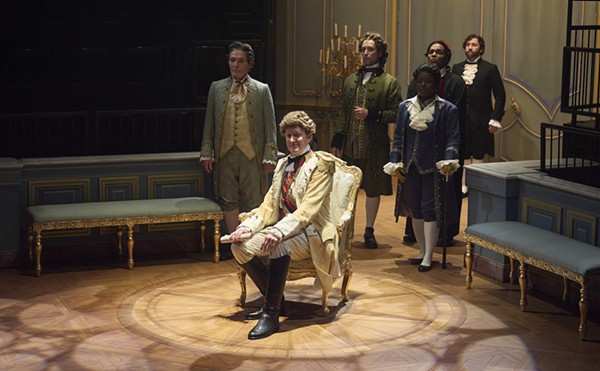Two theaters -- one east, the other west -- are now using this economical form of playmaking to please their divergent populace. In Cleveland Heights, Birkenstock-wearing academics flock to the faded institutional grandeur of the Civic, a former Hebrew temple rededicated as a temple of the arts housing Ensemble Theatre. There, under Lucia Colombi's unobtrusive guidance, Lee Blessing's Going to St. Ives is offering intellectual stimulation to those who like their theater steeped in social conscience. This Greek tragedy-flavored morality play is carved out of stern debate over motherhood and public duty, black and white, civilization and savagery. Blessing's two acts cover the exhausting confrontation between a humanitarian eye doctor and the imperious mother of an Idi Amin-type dictator.
This drama is in the spirit of the high-minded news shows that populate PBS. We learn that Dr. Cora Gage has lost a young son in an act of violence. May N'Kame, visiting England for some crucial eye surgery, recruits the doctor as an ally to help her kill her monstrous son before he destroys their country. She barters the lives of some imprisoned surgeons to get Cora to provide the poison to destroy the potential Hitler that has sprung from May's womb. The writer has come up with a premise as dark, deep, and Freudian as anything in Shakespeare. Suddenly, cultural and geographical gulfs shatter. One woman feels guilty for her son's death, and the other is soon to be guilty of murder. One must betray her Hippocratic oath; the other the bonds of motherhood.
A great writer with the fierce power of an O'Neill or the brooding poetry of a Williams might have used this material to reach emotional heights, but Blessing is capable only of well-crafted but chilly rhetoric. At its best, the writing is as sharp and cutting as the shattered shards of the Blue Willow pottery that both women revere, but ultimately lacks the catharsis, poetry, and humanity that could have elevated it to art. Blessing further sabotages himself by making the second act a redundant reversal of the first, as the doctor pointlessly tries to persuade the now-condemned mother to flee her homeland.
Laura Stitt specializes in cultivated pain. With her trademark tortured stares and a migraine sufferer's tenseness, she is an ideal choice for Cora. She uses her dexterity for suffering, to make innocuous lines sound like Joan of Arc's last agonized plea from the stake. She blithely spills misery over Ensemble's stage. Matching her in intensity, Conni Blair plays her African Medea with a dangerously purring South African dialect and eyes that shine maniacally with panther-like rage.
For the more hedonistic pleasure seekers of the West Side, there's The Owl and the Pussycat. Actress/entrepreneur Barbara Corlette, in a bold pioneer-woman mold, has staked out new territory, transforming a pine-beamed party room into Cleveland's most intimate theater, known as Café Crow. The Fox & Crow Restaurant is a local nightspot with cozy '40s charm; now it has the added cachet of housing the only theater that plies its trade on Monday and Tuesday nights.
To initiate this giddy enterprise, the industrious Corlette, playing star and director, has re-created one of her favorite roles as Doris, one of those ever-hopeful, self-deceiving romantic prostitutes that ruled the '60s.
Bill Manhoff's two-character romantic comedy has been eclipsed by the image of a madcap Barbra Streisand and George Segal trouncing around Manhattan in kooky nightie and PJs. The actual play -- about the painful, tender merging of a pseudo-intellectual writer who can't come to terms with his mediocrity or carnality, and a brassy tart with Eliza Dolittle pretensions -- is far darker than its film incarnation and holds up as a fascinating artifact from a time when males still ruled the sexual roost and there was no debasement too painful for a woman to keep her man. The work is an odd mixture of early Neil Simon battle-of the-sexes fluff and painful Strindbergian masochism. It alternates between scenes of savage humiliation and situation comedy shtick ("I'm a prostitute, but I'm not promiscuous").
In bringing this unfairly neglected work back from oblivion, Corlette has used amazing ingenuity on a minuscule budget, creating evocative sets and costumes and recruiting house bartender/sometime actor Christian Shepard as her leading man. She has made him into a co-star of immense presence, pulling off the nearly impossible feat of turning Manhoff's neurotic weakling into a lost golden boy: a Great Gatsby on the skids. Corlette herself is a superb comedienne, an expert in self-referential camp. To envision how she conquers a stage, one must think of what Bette Midler would be like if she had been born with cover-girl looks and an impeccable flair for pathos. Corlette has a presence and narcissism that could never be confined in an ensemble. As one of Chekhov's Three Sisters, she would elicit giggles, but here, in a two-person work with a companion who matches her in charisma and sex appeal, we have the theatrical equivalent of glorious Technicolor and stereophonic sound.












